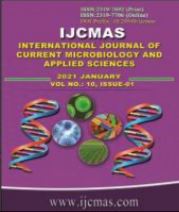


 National Academy of Agricultural Sciences (NAAS)
National Academy of Agricultural Sciences (NAAS)

|
PRINT ISSN : 2319-7692
Online ISSN : 2319-7706 Issues : 12 per year Publisher : Excellent Publishers Email : editorijcmas@gmail.com / submit@ijcmas.com Editor-in-chief: Dr.M.Prakash Index Copernicus ICV 2018: 95.39 NAAS RATING 2020: 5.38 |
Development of high yielding varieties with acceptable level of stability is an important objective of mulberry breeding programme. Thirty selected genotypes and three check varieties were evaluated for leaf yield and its components along with physio-biochemical parameters under rainfed condition. Principal component analysis generated twenty eight PCs, out of which nine PCs exhibited more than one Eigen value explaining 78.6% of variability among the traits studied. Based on biplot analysis, leaf area, leaf moisture, moisture retention capacity, length of longest shoot, primary shoots per plant, total shoots length, total soluble sugars, leaf area index and chlorophyll a/b ratio were identified as important yield contributing traits under rainfed condition. The AMMI analysis of variance across three seasons revealed that the leaf yield was significantly (p<0.01) affected by seasons/environments (E), genotypes (G) but not by G × E interaction. Environment significantly explained about 93.2% of the total sum of squares indicating that diverse seasonal environments caused most of the variations in yield. AMMI stability value (ASV) identified genotype PYD 21, PYD 06, PYD 04, PYD 28, and PYD 01 as the most stable, while PYD 13, PYD 20 as least stable. From the present investigation, Genotypes PYD 08, PYD 15, PYD 27, PYD 01 and PYD 07 were identified as high yielding with better stability across seasons over C-2038 and could be further evaluated to identify suitable variety for rainfed sericulture.
 |
 |
 |
 |
 |